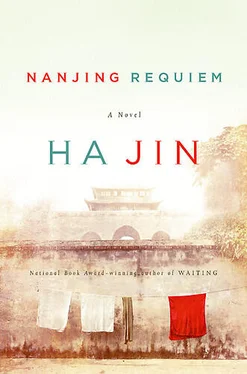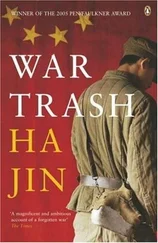“Gosh, what are you doing, proposing to me?” Minnie joked.
“Why not?” he said. “Principal Vaultrin, would you marry me?”
“No, you’re too young for this woman,” Minnie replied.
We all broke up.
Cola went out of the gate, got into his Mercedes with chrome lights and bumpers, and drove away.
After seeing him off, Minnie and I discussed what to do about the five blind girls. I liked them, for they were all cheerful and three of them could knit gloves and hats, and yet I felt they were becoming a burden. Up to now, my daughter had been taking care of them, but Liya might not be able to do this all by herself for long. I said to Minnie, “They’ll be better off if they go to a special school for the blind. We should find a permanent home for them.”
“I’ll write to Shanghai,” she agreed, “to see if they can find a school for the girls.”
“I’m sure there is a place that would like to have them. The girls are quick learners and can earn their own keep.”
Intuitively we both knew we’d better send the blind girls away soon, because if Mrs. Dennison came back, their presence would irritate her. She always emphasized that Jinling must educate the brightest girls in China. We had “to set the bar high for entry” if we wanted to become a preeminent college, ideally China’s Wellesley. The following day Minnie wrote to Ruth Chester, the head of the Chemistry Department who was in charge of the Jinling group in Shanghai, to ask her to look for a school for the five girls.
We felt lucky that we had established the two programs on campus; otherwise the Japanese would have seized the unoccupied classroom buildings and dormitories for military use, as they’d done to some deserted schools in town. On the other hand, we couldn’t help feeling anxious, unable to envision how long the present chaos would last and how the college could ever get back on its feet. Everything seemed to depend on when the Japanese left, which might never happen. They must have meant to make the seized land part of Japan eventually, since the whole purpose of this war was to expand Japanese territory. Was our college gone for good? We were unsure, and the uncertainty tormented us.
Recently more money had been donated by Jinling’s alumnae for setting up a program similar to the Homecraft School, but there was no way Minnie could find more teachers, as most of the educated people had not returned to Nanjing. Minnie said she was glad about the freedom Jinling enjoyed from any government’s restrictions and from the academic rigor of a first-rate college — our two programs could tailor their curricula to suit their own needs. The officials in charge of education in the puppet municipality were supposed to supervise all the schools, but some of them were too ashamed to come and instead would send their minions to do perfunctory inspections. Once in a while, an official or two did show up, but they were all quite lenient and flexible. A few were glad that their daughters had taken the entrance test last fall and been enrolled in our middle school.
IN LATE NOVEMBER the weather turned freezing. The naked branches were coated with hoarfrost in the morning, though water would drip from the trees in the rising sun. The cold weather made it hard for the students, who had to take class in unheated rooms. The coal from Wuhan had arrived two weeks before, but to everyone’s dismay, it wouldn’t burn to give heat. I didn’t know what to do with it and often condemned the dealer representing the coal mine, saying, “He’ll have enough heat in hell.”
“Can’t we get a little good coal from a local seller?” Minnie once asked me.
“There’s no coal for sale anymore, no matter how much we’re willing to pay.”
Every day I wore a pair of woolen pants underneath cotton-padded pants; still, I was chilled to the bone, simply because there was no place and no time I could ever get warm. I’d never felt this cold before. Minnie was also cold all the time. She would warm her fingers around a mug of hot water. Even so, she couldn’t sit in the office for longer than an hour at a stretch. The students suffered more, and some had chilblains on their hands and feet. In class they all crossed their arms, each hand sheathed inside the other sleeve to keep warm. When they wrote, they’d keep breathing on their fingers. We didn’t heat the classrooms yet, having to save the firewood from the felled trees for the coldest days in January. Nowadays the students envied those women in the Homecraft School who could do kitchen duties or take lessons in the four cookhouses, where it was warm.
Minnie would urge me to go out with her, walking as often as possible to quicken the circulation. One morning, as she and I were strolling around, a ruckus broke out at the front gate, and we went over to take a look. “Stop bugging me!” Ban yelled, his shoulder leaning against a stone pillar.
Outside the gate stood Yulan, her arms akimbo, her face smeared with rouge, and her hair combed back into an enormous bun that made her look seven or eight years older. She’d been living with Miss Lou and had snuck back to campus again. “Shame, shame on you, Little Jap. Come out and face justice!” she cried, licking her chapped lips. A crocheted saffron shawl was draped over her shoulders.
“Stinking slut!” Ban cursed.
Minnie went up to the sixteen-year-old boy and said, “You mustn’t let her disturb you like this.”
“She calls me all kinds of names whenever she sees me. Please, Principal Vautrin, give me something else to do so I won’t have to go off campus. I’m scared of her — she waits for me out there all the while.” He then turned to yell at Yulan, “Buzz off, psychopath!”
“Come out, shameless scum!” she shouted, jabbing her forefinger at him while squishing up her face.
“Go fuck yourself!”
“Stop deflowering girls!”
“Go to hell!”
“Monster! You’ll be fried in hell, in a big cauldron of oil!”
“Leave me alone!”
Minnie shook Ban by the shoulder. “You shouldn’t exchange words with her like this. You’re only kicking up a row.”
At this point Miss Lou appeared and pulled Yulan away, while the madwoman went on calling Ban “a pancake-faced Jap.” Hu, a gateman now, asked Minnie whether he should let Yulan in if she came to campus again. “Don’t stop her if she comes for meals,” Minnie told him.
Hu nodded his balding head without another word.
Later Minnie assigned an elderly man to step in for Ban and sent the boy to Shanna to work as a custodian for the Homecraft School, but the trouble with him was far from over. He often clashed with others, wouldn’t listen to Shanna, and even called her a “Japan worshiper” because she used a Japanese facial cream. He seemed particularly fond of fighting with girl students and wouldn’t mend his ways in spite of Shanna’s repeated warnings. As her patience was wearing thin, Shanna declared she’d have him fired sooner or later.
As I mentioned before, I didn’t like Shanna that much; she always called me “Anling,” though I’d told her time and again that she should call me Mrs. Gao. I might be even older than her mother. What’s more, Shanna often wore flowered clothes as if she were a teenager, and she’d hum silly popular songs, such as “I Want You” and “A Boat of Happiness.” As a young lady from Shanghai, she had no idea what a hell Nanjing had gone through last winter.
IN EARLY DECEMBER, without informing us beforehand, my son, Haowen, came to see us. He slipped through Jinling’s front gate, wearing civvies — a bowler hat, a peacoat, and suede shoes. He looked slightly taller than he had five years before, perhaps because he was much thinner and more muscular. He walked with a straight back, more like a man, yet his face was no longer bright. He was twenty-seven but looked like he was in his mid-thirties. His dad, sister, and I were all shocked but elated to see him home. At first I was somewhat unnerved, assuming that he had deserted. Then I thought that it was high time for him to quit the Imperial Army, whether it was by desertion or discharge, as long as he was back home. But he said that his hospital unit was on its way to Luoyang, that they let him off at Nanjing to deliver some documents at the army’s headquarters and also to see his parents. Tomorrow he’d have to head north to catch up with his unit.
Читать дальше











